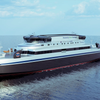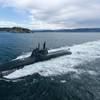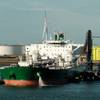Superyacht Operators' Fuel Tax Dodges Stymied
European Union tax revenue authorities are on the alert for any infringement of complicated bunker fuel tax regulations.
Honeypot Diesel
Turn the key of one of the big ones and 10 minutes later you will have spent hundreds of Euros - and that is without even moving from the spot. Add some cruising speed to it and you will be burning at least €2,000 an hour at average speed, based on the current price of diesel in France and Italy. Fuel is obviously the single most expensive cost item of running a superyacht.
Little wonder the realisation triggers various behaviours down there in the Med, some just heady and erratic, others downright rum and perverse. And that is from all of the actors involved - the revenue authorities who tax the stuff to cinders; the law enforcers who often have to administer extra-statutory measures and half-minded tertiary overlays designed to bamboozle; the suppliers, usually at the tail end of a snaky supply chain, always pushing the boundaries for any opportunity to sell; and the consumers with an overly keen appetite for a bargain.
It is a roaring trade assembling an intoxicating mix of actors that produces what can only be described as a seasonal clash of diesel heads. Quarrels do break out, and skirmishes, and swoops by volatile tax police from time to time. As a result, life for superyachts in the Med these days can seem dicey and fraught, because the simple act of fuelling up can end up as a tax trap.
“Well done, Cutty-Sark!”
Late last month it was reported that the Italian tax police had raided a number of yachts in Portosole marina in Sanremo, among other locations, for allegedly taking tax-free fuel. At the same time it emerged that a number of fuel suppliers were under investigation for allegedly breaking the rules in their supplies of tax-free fuel to yachts made in the past five years. The wild speculation the stories generated aside, these incidents brought into sharp relief again the thorny question about tax-free fuelling of superyachts in the Med. They also portray the high stakes involved.
The scantily-clad notion that any commercially registered yacht carrying out charters was entitled to fill its bunkers with tax-free fuel in the EU has seduced us for years. Many well-meaning industry professionals swear by it. The authorities, where they do not positively nod, appear to condone it by sounding at best ambivalent. This did not seem to matter much in the sunny uptimes when the states’ coffers were full and yachting seemed to be recognised for the collateral benefits it brings to several economies.
Now it does matter. Nannie’s nightshirt, suddenly too short and revealing it seems, has caused a hoot. And, as if they have only just been alerted to the goings-on, the customs authorities have sprung into action. They are reviewing and challenging past charter contracts and other documentary proof used to take fuel tax-free. Was it a genuine charter contract or a convenient fake? Who was on board or on the passenger list? Where did the yacht go after taking the fuel? Was the fuel supplied to a foreign based private pleasure yacht for outbound voyages? What evidence did the fuel supplier obtain to justify tax-free sales? Who else is in their supply chain, etc? Suddenly, every past act looks like excess, and it is tax claw-back time.
Escalator effect
Fuel has always been a burning issue in EU taxation. The taxes involved are deemed so important that their framework is set at the highest levels through a specific EU Directive. The structure of excise duties is harmonised across the EU to improve transparency of pricing within its ‘internal market’. But although there is a general rule of minimum rates the system allows for derogations to Member States, which means that the rates themselves still differ from one Member State to the other. These derogations also allow for the countries to have national fuel taxes on top of excise duties and VAT. And, in France and Italy for example, other national measures exist concerning diesel used by certain means of transport. Often an additional fraction of tariff can be applied by regional authorities too, as part of a substructure.
The net result is that somebody stands to lose or gain loads of Euros of consumption taxes at the pump. And that makes national measures on fuel supplied for particular activities with partial or full duty exemption deeply divisive and prone to sabotage. Try telling a regional authority in Corsica or Sardinia of some new-fangled tax exemption measure from Paris or Rome that implies they will lose their additional fraction of excise tariff on which they rely to finance those great “projects of sustainable, railway or river navigation”. And the reverse happens too. Regional schemes to extend duty exemption to pet activities have been known to be knocked on the head by higher central authorities.
By and large national policy measures to ease the burden of fuel taxation tend to target certain means of transport used in agriculture, transport of goods on inland waterways and a host of commercial activities of the utilitarian type that are carried out by “working” ships. These may include harbour cruises, tugging activities, bunkering operations, inland navigation on essential routes between mainland and islands of the same country by vessels of a specified tonnage, dredging operations, conveyance of goods and passengers between shore and ocean going vessels and sea-farming and fishing activities. Such fuel supplied with partial or full duty exemption may be fiscally marked by the authorities in accordance with EU rules (literally coloured) in order to facilitate detection when used by unauthorised means of transport.
Loaded with attitude
Exceptionally, a few EU countries would permit tax-free fuel to be supplied to foreign based private pleasure sea craft for outbound voyages. But even that is now dated because it is at odds with EU VAT law, which specifically directs Member States to exclude “goods transported by the customer himself for the equipping, fuelling and provisioning of pleasure boats and private aircraft or any other means of transport for private use” from the exemption that would otherwise apply when goods are exported from the EU.
Moreover when it comes to fuel supplied to locally based private pleasure sea craft, whether for outbound or inshore voyages, that is now either a no-no or is loaded with attitude. For example, the typical requirement when supplied to locally based private pleasure sea craft for outbound voyages is for excise duty and VAT to be paid in full, and then for a partial refund to be given (so-called “retrospective drawback”) when sufficient proof is provided that such sea craft have touched a foreign land. This enables the authorities in the few EU countries that still permit this to exercise sufficient control and to avoid fraudulent practices.
All of which goes to show that the superyacht that can get away with fuelling tax-free in the Med these days is very lucky indeed. Few have any illusions now that that luck will last, particularly in the wake of the ECJ’s confirmation in the Bacino Charter Company case that no tax exemption should apply to yachts used by individuals for recreational purposes in the high seas. The horror is that changing attitude is revealing itself in its nastier strain, where the taxman seems keen on clawing back the taxes retrospectively, out of the muddle that they helped to create.
Source: Moore Stephens











